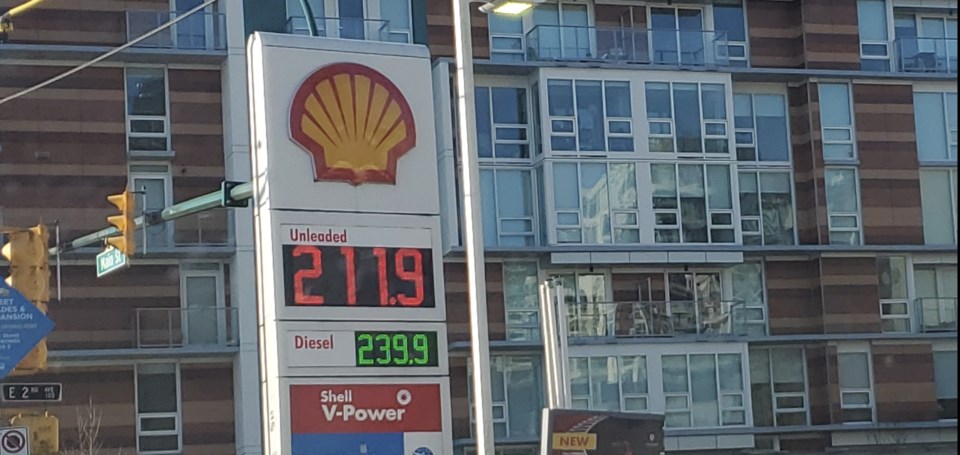British Columbians labouring under record high gasoline prices may get a bit of relief in the next day or two, as gasoline prices are expected to drop as much as 15 cents per litre, following a slightly cooled oil price frenzy.
That’s the good news. The bad news is that one of the myriad factors that contribute to gasoline prices – a seasonal switch to summer fuel blends – is just around the corner, followed by summer vacation season. Those factors can also add pennies to each litre of gasoline.
Regular gasoline prices in Metro Vancouver are in the $2.11 per litre range today.
“You’re going to see lower prices tomorrow,” said Vijay Muralidharan, a petroleum analyst and senior consultant at Kalibrate.
GasWizard, on the other hand, predicts gasoline prices could rise three cents per litre in Vancouver tomorrow, and then drop by as much as 15 cents by Friday to an average price of $1.99 per litre of regular gasoline.
There are numerous factors that contribute to gasoline prices, and the price of oil is what has been driving the latest record-breaking surge in gasoline prices in North America.
Gasoline prices are up everywhere, but are particularly high on the West Coast, in B.C. and California, which are experiencing record breaking gasoline prices.
War in Ukraine, sanctions against Russia and the threat of halting Russian oil imports in the U.S. and possibly elsewhere sent speculators into a panic earlier this week, driving global oil prices above US$130 per barrel. Prices have since come down to the $US110 per barrel range. As oil prices drop, so too should gasoline prices.
Muralidharan said close to half of what Vancouverites are paying for gas right now is the price of oil.
In Vancouver, at $2.09 per litre, he said oil accounts for $0.92 cents. Taxes account for $0.57, refining margins $0.52 and retail margins $0.08.
Outside of the Metro Vancouver Transit region, taxes are slightly lower, as drivers there don’t pay a special transit levy.
Vancouver typically has some of the highest gasoline prices in North America. That’s partly because it has the highest taxes on gasoline.
It has the highest carbon taxes, which currently adds $0.10 cents to a litre of gasoline and which will go up by one cent on April 1. The TransLink motor fuel levy costs $0.18 per litre. Another $0.07 comes from the BC Transportation Financing Authority Motor Fuel tax, and the provincial motor fuel tax adds another cent or two.
In total, provincial taxes add $0.37 to each litre of gasoline. There are also federal excise taxes and goods and services taxes on petroleum products.
"Vancouver has the highest tax regime for gasoline in the whole country," Muralidharan said. "The national average is 49 (cents); Vancouver is 57. So you have almost a 10-cent premium in taxes."
But there are reasons as well, and a lot has to do with a lack of domestic refining and pipeline capacity.
Wholesale prices are typically higher in B.C. than in Alberta. In 2019, the John Horgan government tasked the BC Utilities Commission (BCUC) to conduct an inquiry, which ended somewhat inconclusively.
The inquiry concluded that, though there was no evidence of collusion by suppliers to over-charge for gasoline, the gas market in B.C. is not truly competitive. Ultimately, it could not explain why there is $0.13 per litre difference in the wholesale price in B.C. and elsewhere in Canada.
Some industry analysts say B.C.’s low-carbon fuel standard is a kind of hidden tax that may account for at least some of the disparity, since it adds to the cost of refining for gasoline sold in B.C.
But Kent Fellows, a professor at the University of Calgary’s Public School of Public Policy, has since conducted research that suggests the wholesale price difference has something to do with B.C.’s lack of refining and pipeline capacity, and a 2015 change that increased flows of crude oil on the Trans Mountain pipeline, reducing the amount of refined fuels that can move on it from Alberta refineries to B.C.
A single refinery in Burnaby supplies Metro Vancouver with about a third of its refined petroleum products. The rest mostly comes from Alberta refineries via the Trans Mountain pipeline and by rail, with small amounts coming from Washington State refineries.
Fellows notes that, in 2015, there was a rule change that "dramatically" reduced gasoline shipments from Alberta on the pipeline in favor of crude oil shipments. This forced more refined fuel to come to B.C. by rail, which is a more expensive option.
“Most of the price difference between B.C. and Alberta … is due to insufficient pipeline capacity for refined products (gas and diesel) between Edmonton area refineries and the coast,” Fellows said in an email to BIV News.
“This causes marginal volumes to be shipped by rail at a much higher cost than pipe. You can see this reflected in the wholesale prices in the two provinces.”

